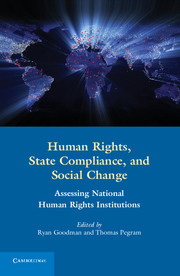11 - Through Pressure or Persuasion?
Explaining Compliance with the Resolutions of the Bolivian Defensor del Pueblo
from PART III - NHRIs and Compliance
Published online by Cambridge University Press: 05 June 2012
Summary
Introduction
The human rights ombudsman is often held up as an important invention in the area of national human rights institutions (NHRIs). But it is a curious institution. While the ombudsman variant of the NHRI is in most cases endowed with a broad mandate and far-reaching powers to investigate and issue judgments as to whether state entities respect the legal and constitutional rights of the citizenry, it lacks coercive powers. Its resolutions are recommendations that other state actors may heed or disregard as they see fit.
The ability of the human rights ombudsman to protect citizens’ rights is thus not a given, but rather varies across cases. While one national office may achieve compliance with most of its resolutions, another may find itself completely disregarded. This chapter addresses the reasons that underlie such variation, and how the human rights ombudsman may work to achieve compliance in the absence of formal enforcement powers.
- Type
- Chapter
- Information
- Human Rights, State Compliance, and Social ChangeAssessing National Human Rights Institutions, pp. 270 - 294Publisher: Cambridge University PressPrint publication year: 2011
References
- 2
- Cited by

